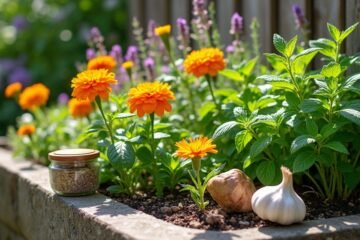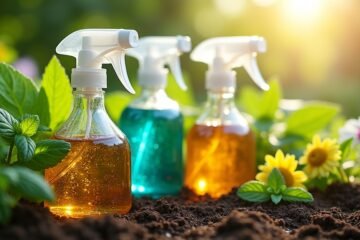If you want to grow a flourishing garden, you can’t go wrong with compost, manure, and bone meal! Compost enriches your soil like magic, turning kitchen scraps into gold! Manure, like a secret weapon, boosts moisture and microbes for thriving plants. Bone meal works wonders for roots and blooms, but remember, a little goes a long way! With these natural treasures, your garden will sing with joy! Curious about how to use them? There’s so much more to uncover!
Compost
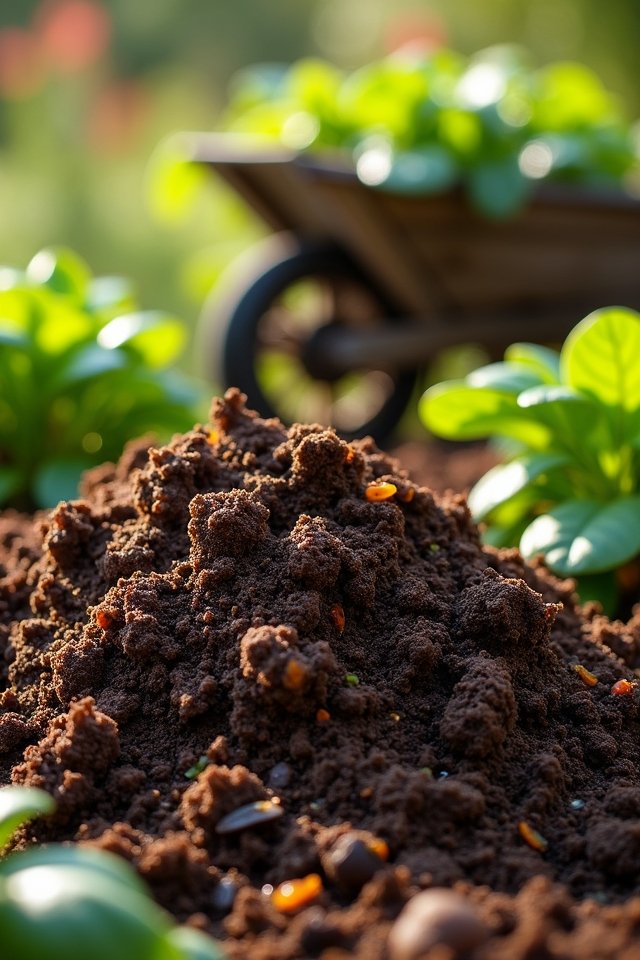
Compost is like a treasure chest for your garden, brimming with nutrients! By using vermicomposting methods, you can transform kitchen scraps into organic gold. Picture hundreds of cheerful earthworms wriggling and breaking down waste—that’s nature’s magic at work! You can even brew compost tea, a liquid gold for your plants. Just imagine a rich, earthy potion, teeming with beneficial microbes ready to invigorate your soil! Sprinkling this tea around helps your plants thrive, fighting off pests and boosting growth. It’s like giving your garden a nutrient-packed smoothie! Why wouldn’t you want to harness this innovative, sustainable method? Start composting and watch your garden flourish, as vibrant greens spiral into a lush wonderland! Nature’s wealth awaits!
Manure
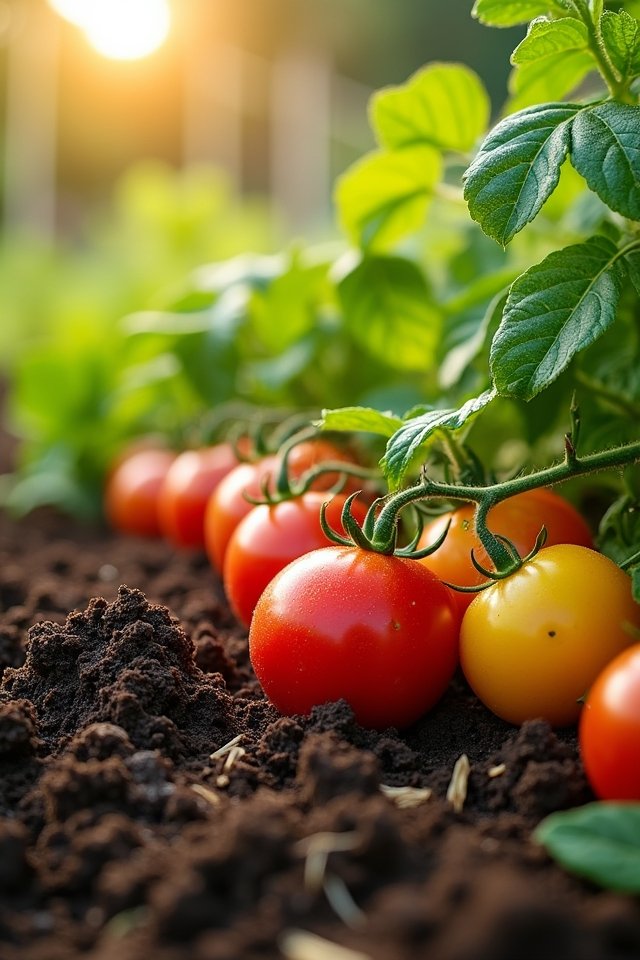
Manure is nature’s little secret weapon for your garden! Packed with nutrients, different manure types—like chicken, cow, and horse—can transform your soil into a vibrant powerhouse. You’re not just adding fertilizer; you’re creating a thriving ecosystem!
Imagine your plants soaking up all those rich minerals, just like a sponge in a puddle. The manure benefits are incredible: it boosts soil structure, enhances moisture retention, and promotes beneficial microbial activity.
But don’t forget to compost that manure first—raw manure can be a bit too intense for delicate plants! Give your garden the gift of this natural gold, and watch your veggies, herbs, and flowers flourish like never before! What’s stopping you from accessing nature’s incredible bounty?
Bone Meal
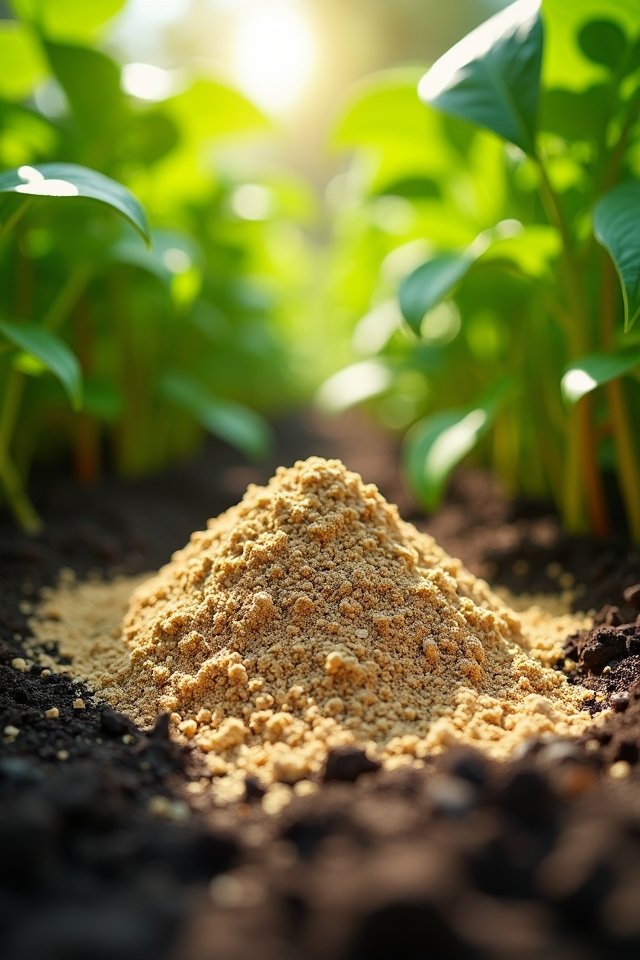
Ready to add some serious oomph to your garden? Let’s talk bone meal! This powerhouse fertilizer is like a secret weapon for your plants. Packed with phosphorus, it encourages explosive root growth and bountiful blooms. Imagine your flowers bursting with vibrant colors or your vegetables getting plump and juicy—sounds tempting, right? For effective bone meal application, sprinkle it around your plants before watering, letting it work its magic in the soil. Just a little can go a long way! But be careful not to overdo it; a light touch is all you need. So, why not give your garden that much-needed boost? Welcome the bone meal benefits and watch your garden transform into a lush paradise!
Frequently Asked Questions
How Do I Balance Nitrogen and Phosphorus in My Organic Fertilizer?
You’re in the thick of it, huh? Balancing nitrogen and phosphorus in your organic fertilizer can feel like walking a tightrope! To strike that perfect harmony, mix nitrogen sources like blood meal or alfalfa meal with phosphorus sources like bone meal or rock phosphate. Aim for a balanced N-P ratio, like 4:1! Just remember, too much of one can throw your plants into a tizzy. Keep experimenting, and soon you’ll find that sweet spot!
Can I Use Kitchen Scraps as Fertilizer?
Absolutely, you can use kitchen scraps as fertilizer! It’s like giving your plants a hearty meal. Kitchen composting benefits include rich nutrients that enhance soil health and promote vibrant growth. Think veggie peels and coffee grounds! They’re perfect scrap recycling methods that turn trash into treasure. Just imagine your garden thriving with the love from your leftover scraps. Why waste when you can nourish? It’s a win-win for you and Mother Nature!
How Often Should I Apply Natural Fertilizers?
So, how often should you apply natural fertilizers? It really depends! Generally, apply every 4–6 weeks during the growing season for that nutrient boost your plants crave! Adjust according to the season; think of it as a cozy blanket for your plants—too much, and they might overheat! Just sprinkle some bonny compost or rich manure and watch them flourish. Trust me, your veggies will thank you with more vibrant colors and delicious flavors!
Are There Any Naturally Occurring Fertilizers for Specific Plants?
Did you know that 90% of plants need specific nutrients to thrive? Absolutely amazing, right? For your tomato plants, consider using coffee grounds as a natural amendment. They’re rich in nitrogen, which helps those juicy fruits flourish! Likewise, banana peels are a potassium powerhouse—perfect for your blooming roses. Just toss those scraps into your garden! Who wouldn’t want vibrant plants without the chemical fuss? Give nature a chance, and watch your garden thrive!
What Is the Best Way to Store Natural Fertilizers?
You’ve got to store natural fertilizers right if you want that fertilizer longevity! Use airtight storage containers, like glass jars or heavy-duty bins, to keep them fresh. Label ‘em, so you won’t mistake bone meal for something else—yikes! Keep your containers cool and dry; think of it as giving them a cozy home. Just like a plant needs the right environment, so do your fertilizers. Happy gardening! 🌱
